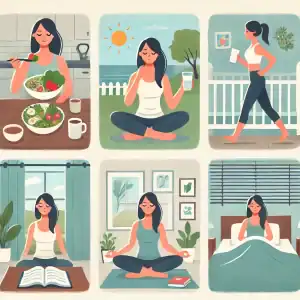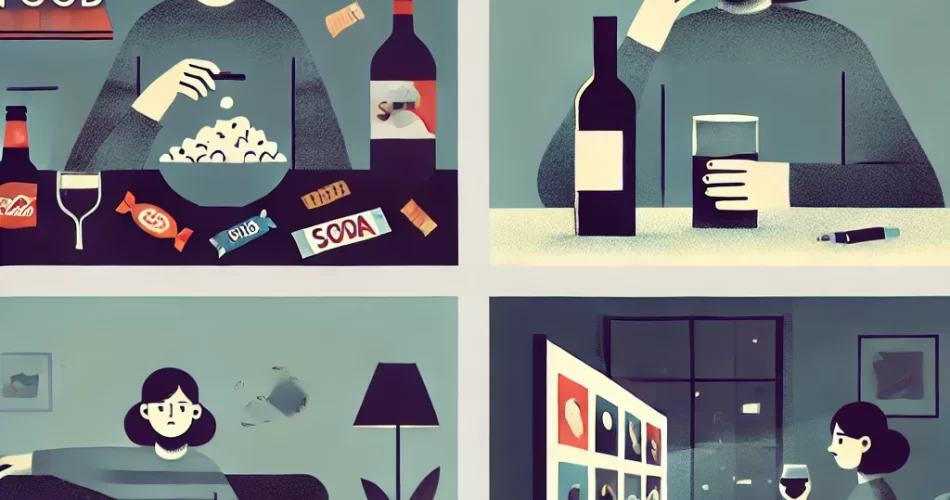Why We Repeat Unhealthy Habits (Even When We Know Better)
Understanding the Struggle for Self-Improvement
We’ve all been there—doing the very thing we know isn’t good for us. Maybe it’s reaching for that extra drink, staying up way too late scrolling through social media, or going back to someone who clearly disrupts our peace. It’s frustrating, because deep down, we do know better.
For me, it was grabbing that extra slice of cake when I was already full, or mindlessly eating while binging a show. Skipping workouts even though I knew they’d boost my mood. Dating the same type of person over and over—different face, same energy.
It starts to feel like we’re caught in a loop, consciously choosing behaviors that pull us further from the version of ourselves we’re trying to become.
So why do we keep doing it?
Let’s break it down.
The Paradox of Self-Sabotaging Behavior
Here’s the thing: self-sabotaging behavior doesn’t mean you’re weak or broken. It usually means your brain is doing what it’s been trained to do—seek comfort, avoid pain, and lean into familiarity.
And even if those behaviors cause long-term harm, they can feel safe in the moment. That’s the paradox—knowing something hurts you, but doing it anyway.
Why We Keep Doing Things That Hurt Us (Even When We Know Better)
Ever catch yourself doing something you know isn’t good for you—and then doing it again anyway? Whether it’s staying in a toxic relationship, scrolling endlessly through social media, or reaching for that third glass of wine after a stressful day, you’re not alone. The truth is, we often know what’s bad for us—but breaking free from those behaviors is another story.
Here’s what’s really going on underneath the surface.
1. The Brain Loves Rewards (Even the Toxic Kind)
Our brains are wired to chase dopamine—the “feel-good” neurotransmitter. Every time we experience pleasure from something quick and gratifying (a cigarette, a sweet treat, or even a toxic text that gives us a fleeting rush), our brain logs it as a win.
Over time, these moments form strong neurological connections. According to Cleveland clinic repeated behaviors that release dopamine can become automatic, which is why bad habits are so hard to shake. In other words, your brain doesn’t always care if something is good for you—it just cares if it feels good right now.
This is why change can feel like pushing against a brick wall. You’re not just fighting your willpower—you’re rewiring your brain.
2. Cognitive Dissonance: When Your Brain Fights Itself
Have you ever felt that internal conflict between what you believe and what you do? That’s cognitive dissonance. It’s a kind of mental discomfort that occurs when your actions don’t line up with your values or knowledge.
To reduce this discomfort, the brain starts to rationalize. You might think, “It’s not that bad,” or “I deserve this after the day I’ve had.” As Verywell Mind explains, we often justify harmful behaviors just to avoid the uncomfortable feeling of being out of alignment with ourselves.
This isn’t about being weak—it’s about how the mind tries to protect itself from discomfort, even at a cost.
3. Akrasia: Knowing Better, Doing Worse
The ancient Greeks had a name for this struggle: akrasia—when you act against your better judgment.
You know you should go to bed earlier, avoid that argument, or skip the junk food. And yet… you don’t.
The thing is, it’s not just about laziness or poor self-control. As Wikipedia points out, akrasia can be influenced by everything from decision fatigue to emotional exhaustion and even your physical environment. If your home or workplace is full of triggers, your odds of making healthy choices drop.
Recognizing akrasia helps us stop blaming ourselves and start asking better questions: What’s really getting in my way?
4. Emotional Habits That Harm Us
Some of our most self-destructive behaviors started as survival tools. That nightly glass of wine or that habit of emotionally shutting down might have helped you get through a rough chapter. But if they outstay their welcome, they turn into emotional habits that hurt more than they help.
These are called maladaptive coping mechanisms, and they often sneak in when we’re under emotional strain. Positive Psychology explains that while these behaviors may offer short-term relief, they keep us stuck in the long run unless we unpack where they came from.
When you stop judging yourself and get curious about the why, you can finally start to break free.
5. Social Pressure and Toxic Patterns
Let’s not forget the influence of our environment. Sometimes we stay stuck in patterns not because we want to—but because it feels like everyone else is doing the same. Think of the friend group that normalizes gossip, or a family that sweeps dysfunction under the rug.
We’re social creatures, and fitting in often feels safer than standing out.
This is why real change can sometimes mean changing who you spend time with, what media you consume, or how you define “normal.”
A Real-Life Reminder: Bill Wilson and the Power of Change
One powerful example of lasting change is Bill Wilson, the co-founder of Alcoholics Anonymous (AA). For years, Bill battled severe alcoholism. Despite knowing the toll it was taking on his body, relationships, and career, he couldn’t stop—an experience many can relate to when caught in the cycle of self-destructive habits. His turning point came in 1934, not through willpower alone, but through a combination of personal crisis, spiritual insight, and the support of others who had faced similar struggles.
According to his biography on Wikipedia, Bill had a profound spiritual experience while hospitalized for treatment. This awakening didn’t instantly cure him, but it shifted his mindset. He realized that helping others might be the key to helping himself. That idea became the foundation of Alcoholics Anonymous—a peer-led recovery movement that has since helped millions of people around the world.
Bill’s story is a testament to the fact that transformation is possible—even after years of repeating harmful behaviors. His journey reminds us that change often begins not with a grand gesture, but with a moment of clarity and the decision to reach out for connection, truth, and purpose.
How to Stop Doing Things That Hurt Us

Understanding the “why” is important, but now let’s talk about how to stop doing things that hurt us. Here are a few doable steps:
1. Build Self-Awareness
Journaling, meditation, or even just checking in with yourself can help you spot your triggers and patterns.
2. Don’t Go It Alone
Therapists or support groups can help you explore the deeper layers behind your habits. Professional support is a game-changer.
3. Change Your Environment
If your surroundings keep pulling you back into old behaviors, it’s time for a reset. That might mean shifting your space, your schedule—or your circle.
4. Set Small, Realistic Goals
You don’t have to overhaul your life in one day. Start small. Celebrate progress, not perfection.
Why we make bad choices isn’t always about being lazy, reckless, or weak. Most of the time, it’s about being human. And thankfully, being human also means we have the power to grow, learn, and shift direction.
You’re not stuck—you’re just learning. And every step forward counts.

